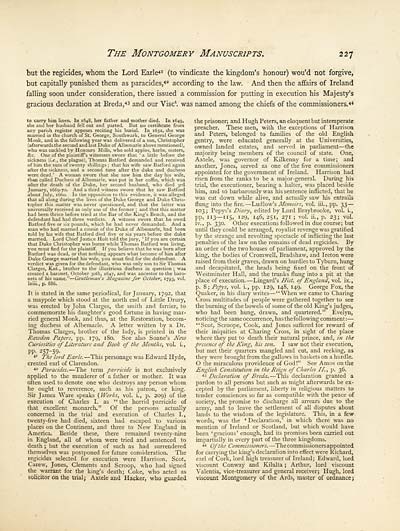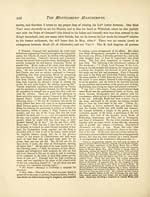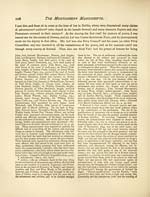Montgomery manuscripts
(241) Page 227
Download files
Complete book:
Individual page:
Thumbnail gallery: Grid view | List view

The Montgomery Manuscripts.
227
but the regicides, whom the Lord Earle* 1 (to vindicate the kingdom's honour) wou'd not forgive,
but capitally punished them as paracides, 43 according to the law. And then the affairs of Ireland
falling soon under consideration, there issued a commission for putting in execution his Majesty's
gracious declaration at Breda, 43 and our Vise', was named among the chiefs of the commissioners. 44
to carry him linen. In 1648, her father and mother died. In 1649,
she and her husband fell out and parted. But no certificate from
any parish register appears reciting his burial. In 1652. she was
married in the church of St. George, Southwark, to General George
Monk, and in the following year was delivered of a son, Christopher
(afterwards the second and last Duke of Albemarle above mentioned),
who was suckled by Honours Mills, who sold apples, herbs, oisters,
&c. One of the plaintiff's witnesses swore that ' a little before the
sickness {i.e., the plague), Thomas Batford demanded and received
of him the sum of twenty shillings ; that his wife saw Batford again
after the sickness, and a second time after the duke and duchess
were dead.' A woman swore that she saw him the day his wife,
then called Duchess of Albemarle, was put in her coffin, which was
after the death of the Duke, her second husband, who died 3rd
January, r66o-7o. And a third witness swore that he saw Batford
about July, 1660. In the opposition to this evidence, it was alleged
that all along during the lives of the Duke George and Duke Chris-
topher this matter was never questioned, and that the latter was
universally received as only son of the former ; and that this matter
had been thrice before tried at the Bar of the King's Bench, and the
defendant had had three verdicts. A witness swore that he owed
Batford five or six pounds, which he had never demanded. And a
man who had married a cousin of the Duke of Albemarle, had been
told by his wife that Batford died five or six years before the duke
married. Lord Chief Justice Holt told the jury, ' If you are certain
that Duke Christopher was borne while Thomas Batford was living,
you must find for the plaintiff. If you believe that he was born after
Batford was dead, or that nothing appears what become of him after
Duke George married his wife, you must find for the defendant. A
verdict was given for the defendant, who was only son to Sir Thomas
Clarges, Knt., brother to the illustrious duchess in question ; was
created a baronet, October 30th, 1647, and was ancestor to the baro-
nets of his name." — Gentleman' s Magazine /or October, 1793, vol.
Lxiii., p. 886.
It is stated in the same periodical, for January, 1792, that
a maypole which stood at the north end of Little Drury,
was erected by John Clarges, the smith and farrier, to
commemorate his daughter's good fortune in having mar-
ried general Monk, and thus, at the Restoration, becom-
ing duchess of Albemarle. A letter written by a Dr.
Thomas Clarges, brother of the lady, is printed in the
Rawdon Papers, pp. 179, 180. See also Soane's New
Curiosities of Literature and Book of the Months, voL i.,
pp. 257-59.
41 The lord Earle. — This personage was Edward Hyde,
created earl of Clarendon.
42 Paracides. — The term parricide is not exclusively
applied to the murderer of a father or mother. It was
often used to denote one who destroys any person whom
he ought to reverence, such as his patron, or king.
Sir James Ware speaks (Works, vol. i., p. 209) of the
execution of Charles I. as "the horrid parricide of
that excellent monarch." Of the persons actually
concerned in the trial and execution of Charles I.,
twenty-five had died, sixteen had escaped to various
places on the Continent, and three to New England in
America. Beside these, there remained twenty-nine
in England, all of whom were tried and sentenced to
death ; but the execution of such as had surrendered
themselves was postponed for future consideration. The
regicides selected for execution were Harrison, Scot,
Carew, Jones, Clements and Scroop, who had signed
the warrant for the king's death; Coke, who acted as
solicitor on the trial; Axtele and Hacker, who guarded
the prisoner; and Hugh Peters, an eloquent but intemperate
preacher. These men, with the exceptions of Harrison
and Peters, belonged to families of the old English
gentry, were educated generally at the Universities,
owned landed estates, and served in parliament — the
majority being members of tire council of state. One,
Axtele, was governor of Kilkenny for a time; and
another, Jones, served as one of the five commissioners
appointed for the government of Ireland. Harrison had
risen from the ranks to be a major-general. During his
trial, the executioner, bearing a halter, was placed beside
him, and so barbarously was his sentence inflicted, that he
was cut down while alive, and actually saw his entrails
flung into the fire. — Ludlow's Memoirs, vol. Hi., pp. 33 —
103 ; Pepys's Diary, edited by Lord Braybrooke, vol. i. ,
pp, 113— 115, 129, 146, 251, 271 ; vol. ii., p. 23; vol.
iv., p. 330. Other executions followed in due course; but
until they could be arranged, royalist revenge was gratified
by the strange and revolting spectacle of inflicting the last
penalties of the law on the remains of dead regicides. By
an order of the two houses of parliament, approved by the
king, the bodies of Cromwell, Bradshaw, and Ireton were
raised from their graves, drawn on hurdles to Tyburn, hung
and decapitated, the heads being fixed on the front of
Westminster Hall, and the trunks flung into a pit at the
place of execution. — Lingard's Hist, of England, vol. ix.,
p. 8; Pefys, vol. i. , pp. 129, 148, 149. George Fox, the
Quaker, in his diary writes — "When we came to Charing
Cross multitudes of people were gathered together to see
the burning of the bowels of some of the old King's judges,
who had been hung, drawn, and quartered." Evelyn,
noticing the same occurrence, has the following comment : — -
"Scot, Scroope, Cook, and Jones suffered for reward of
their iniquities at Charing Cross, in sight of the place
where they put to death their natural prince, and, in the
presence of the King, his son. I saw not their execution,
but met their quarters mangled and cut, and reeking, as
they were brought from the gallows in baskets on a hurdle.
O the miraculous providence of God!" See Amos on the
English Constitution in the Reign of Charles II. , p. 36.
4 3 Declaration of Breda. — This declaration granted a
pardon to all persons but such as might afterwards be ex-
cepted by the parliament, liberty in religious matters to
tender consciences so far as compatible with the peace of
society, the promise to discharge all arrears due to the
army, and to leave the settlement of all disputes about
lands to the wisdom of the legislature. This, in a few
words, was the ' Declaration, ' in which there was no
mention of Ireland or Scotland, but which would have
been 'gracious' enough, had its promises been carried out
impartially in every part of the three kingdoms.
44 Of the Commissioners. — Thecommissionersappointed
for carrying the king's declaration into effect were Richard,
earl of Cork, lord high treasurer of Ireland; Edward, lord
viscount Conway and Kilulta ; Arthur, lord viscount
Valentia, vice-treasurer and general receiver; Hugh, lord
viscount Montgomery of the Ards, master of ordnance;
227
but the regicides, whom the Lord Earle* 1 (to vindicate the kingdom's honour) wou'd not forgive,
but capitally punished them as paracides, 43 according to the law. And then the affairs of Ireland
falling soon under consideration, there issued a commission for putting in execution his Majesty's
gracious declaration at Breda, 43 and our Vise', was named among the chiefs of the commissioners. 44
to carry him linen. In 1648, her father and mother died. In 1649,
she and her husband fell out and parted. But no certificate from
any parish register appears reciting his burial. In 1652. she was
married in the church of St. George, Southwark, to General George
Monk, and in the following year was delivered of a son, Christopher
(afterwards the second and last Duke of Albemarle above mentioned),
who was suckled by Honours Mills, who sold apples, herbs, oisters,
&c. One of the plaintiff's witnesses swore that ' a little before the
sickness {i.e., the plague), Thomas Batford demanded and received
of him the sum of twenty shillings ; that his wife saw Batford again
after the sickness, and a second time after the duke and duchess
were dead.' A woman swore that she saw him the day his wife,
then called Duchess of Albemarle, was put in her coffin, which was
after the death of the Duke, her second husband, who died 3rd
January, r66o-7o. And a third witness swore that he saw Batford
about July, 1660. In the opposition to this evidence, it was alleged
that all along during the lives of the Duke George and Duke Chris-
topher this matter was never questioned, and that the latter was
universally received as only son of the former ; and that this matter
had been thrice before tried at the Bar of the King's Bench, and the
defendant had had three verdicts. A witness swore that he owed
Batford five or six pounds, which he had never demanded. And a
man who had married a cousin of the Duke of Albemarle, had been
told by his wife that Batford died five or six years before the duke
married. Lord Chief Justice Holt told the jury, ' If you are certain
that Duke Christopher was borne while Thomas Batford was living,
you must find for the plaintiff. If you believe that he was born after
Batford was dead, or that nothing appears what become of him after
Duke George married his wife, you must find for the defendant. A
verdict was given for the defendant, who was only son to Sir Thomas
Clarges, Knt., brother to the illustrious duchess in question ; was
created a baronet, October 30th, 1647, and was ancestor to the baro-
nets of his name." — Gentleman' s Magazine /or October, 1793, vol.
Lxiii., p. 886.
It is stated in the same periodical, for January, 1792, that
a maypole which stood at the north end of Little Drury,
was erected by John Clarges, the smith and farrier, to
commemorate his daughter's good fortune in having mar-
ried general Monk, and thus, at the Restoration, becom-
ing duchess of Albemarle. A letter written by a Dr.
Thomas Clarges, brother of the lady, is printed in the
Rawdon Papers, pp. 179, 180. See also Soane's New
Curiosities of Literature and Book of the Months, voL i.,
pp. 257-59.
41 The lord Earle. — This personage was Edward Hyde,
created earl of Clarendon.
42 Paracides. — The term parricide is not exclusively
applied to the murderer of a father or mother. It was
often used to denote one who destroys any person whom
he ought to reverence, such as his patron, or king.
Sir James Ware speaks (Works, vol. i., p. 209) of the
execution of Charles I. as "the horrid parricide of
that excellent monarch." Of the persons actually
concerned in the trial and execution of Charles I.,
twenty-five had died, sixteen had escaped to various
places on the Continent, and three to New England in
America. Beside these, there remained twenty-nine
in England, all of whom were tried and sentenced to
death ; but the execution of such as had surrendered
themselves was postponed for future consideration. The
regicides selected for execution were Harrison, Scot,
Carew, Jones, Clements and Scroop, who had signed
the warrant for the king's death; Coke, who acted as
solicitor on the trial; Axtele and Hacker, who guarded
the prisoner; and Hugh Peters, an eloquent but intemperate
preacher. These men, with the exceptions of Harrison
and Peters, belonged to families of the old English
gentry, were educated generally at the Universities,
owned landed estates, and served in parliament — the
majority being members of tire council of state. One,
Axtele, was governor of Kilkenny for a time; and
another, Jones, served as one of the five commissioners
appointed for the government of Ireland. Harrison had
risen from the ranks to be a major-general. During his
trial, the executioner, bearing a halter, was placed beside
him, and so barbarously was his sentence inflicted, that he
was cut down while alive, and actually saw his entrails
flung into the fire. — Ludlow's Memoirs, vol. Hi., pp. 33 —
103 ; Pepys's Diary, edited by Lord Braybrooke, vol. i. ,
pp, 113— 115, 129, 146, 251, 271 ; vol. ii., p. 23; vol.
iv., p. 330. Other executions followed in due course; but
until they could be arranged, royalist revenge was gratified
by the strange and revolting spectacle of inflicting the last
penalties of the law on the remains of dead regicides. By
an order of the two houses of parliament, approved by the
king, the bodies of Cromwell, Bradshaw, and Ireton were
raised from their graves, drawn on hurdles to Tyburn, hung
and decapitated, the heads being fixed on the front of
Westminster Hall, and the trunks flung into a pit at the
place of execution. — Lingard's Hist, of England, vol. ix.,
p. 8; Pefys, vol. i. , pp. 129, 148, 149. George Fox, the
Quaker, in his diary writes — "When we came to Charing
Cross multitudes of people were gathered together to see
the burning of the bowels of some of the old King's judges,
who had been hung, drawn, and quartered." Evelyn,
noticing the same occurrence, has the following comment : — -
"Scot, Scroope, Cook, and Jones suffered for reward of
their iniquities at Charing Cross, in sight of the place
where they put to death their natural prince, and, in the
presence of the King, his son. I saw not their execution,
but met their quarters mangled and cut, and reeking, as
they were brought from the gallows in baskets on a hurdle.
O the miraculous providence of God!" See Amos on the
English Constitution in the Reign of Charles II. , p. 36.
4 3 Declaration of Breda. — This declaration granted a
pardon to all persons but such as might afterwards be ex-
cepted by the parliament, liberty in religious matters to
tender consciences so far as compatible with the peace of
society, the promise to discharge all arrears due to the
army, and to leave the settlement of all disputes about
lands to the wisdom of the legislature. This, in a few
words, was the ' Declaration, ' in which there was no
mention of Ireland or Scotland, but which would have
been 'gracious' enough, had its promises been carried out
impartially in every part of the three kingdoms.
44 Of the Commissioners. — Thecommissionersappointed
for carrying the king's declaration into effect were Richard,
earl of Cork, lord high treasurer of Ireland; Edward, lord
viscount Conway and Kilulta ; Arthur, lord viscount
Valentia, vice-treasurer and general receiver; Hugh, lord
viscount Montgomery of the Ards, master of ordnance;
Set display mode to:
![]() Universal Viewer |
Universal Viewer | ![]() Mirador |
Large image | Transcription
Mirador |
Large image | Transcription
Images and transcriptions on this page, including medium image downloads, may be used under the Creative Commons Attribution 4.0 International Licence unless otherwise stated. ![]()
| Histories of Scottish families > Montgomery manuscripts > (241) Page 227 |
|---|
| Permanent URL | https://digital.nls.uk/95235819 |
|---|
| Description | A selection of almost 400 printed items relating to the history of Scottish families, mostly dating from the 19th and early 20th centuries. Includes memoirs, genealogies and clan histories, with a few produced by emigrant families. The earliest family history goes back to AD 916. |
|---|

